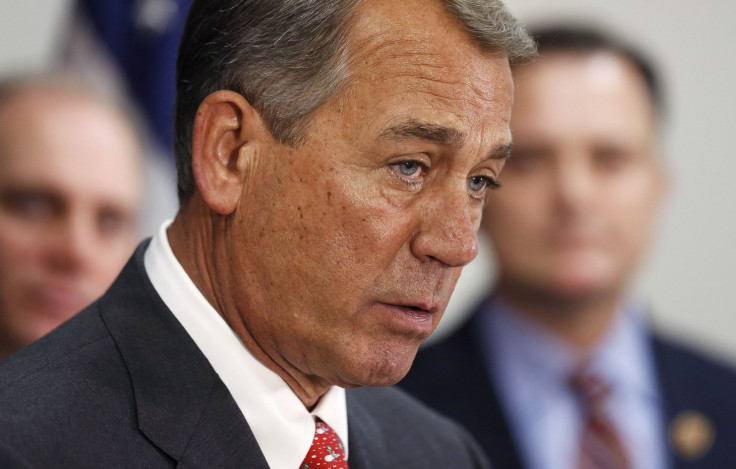Spending Bill: Republicans Get Dodd-Frank, Campaign Finance, EPA Changes

WASHINGTON – The $1.1 trillion spending bill that is expected to move through Congress this week is, nominally, a bipartisan achievement -- but Republicans see it as a win for their side. The bill is jammed with provisions the GOP pushed for, even if it doesn’t include the biggest item on their wish list, undoing President Barack Obama’s executive orders on immigration.
The bill may be the first sign of how Republicans could legislate in the next two years, demonstrating that GOP lawmakers can attach their own priorities to must-pass bills that Obama is likely to sign.
Sure, the bill still has to actually pass both chambers of Congress, and Democrats are fuming about reversal of Wall Street regulations that are part of the Dodd-Frank financial reform law. But there's no sign yet that unhappy liberals could tank the legislation and force a government shutdown.
What did the Democrats get? The government is going to stay open and they aren't relitigating the Affordable Care Act again. Otherwise, none of the policy riders are being cheered by Democrats.
Even if Democrats ultimately prevail in getting the the Dodd-Frank provisions out of the bill, Republicans did get Democratic negotiators in the Senate to include the proposed changes. That's strong evidence that Republicans will be able to force real legislative change once they take over the Senate in January.
“At the end of the day we didn’t get all the riders we put in the original appropriations bill or all the ones we would like, but we got a significant number and we got them on fairly important issues that move the ball down the field,” Republican Rep. Andy Harris, of Maryland, said. Harris pushed for the inclusion of a rider that will bar the District of Columbia from moving forward with plans to authorize the sale and tax of marijuana for recreational use.
There is always the risk Republicans could overplay their hand. That is, after all, what caused the government shutdown in 2013. Republicans tried to force the White House to backtrack on Obamacare, the president stared them down, and the GOP was blamed for the 16-day shutdown.
This cycle they tried a different tactic. Instead of large, marquee changes to any law or policy they hate, Republicans successfully included small but substantive changes. For example, the bill prohibits the Environmental Protection Agency from barring companies from producing incandescent light bulbs -- a frequent conservative talking point among consumers who don't want to be forced to buy energy-efficient fixtures that they dislike.
The spending bill, dubbed a “cromnibus” because it combines two types of appropriation legislation, is littered with similar examples of Republican victories.
After Dodd-Frank, the second biggest accomplishment for the GOP is changes to campaign finance law. Under the proposed changes, the Republican National Committee and Democratic National Committee could now accept donations up to $324,000 -- a large increase from the current $32,400 limit. The tenfold increase in allowable donations is achieved by creating new committees within the parties that can accept large donations, including funds for holding nominating conventions, buildings and recounts.
The bill also prohibits the federal government from requiring that companies disclose their political donations before applying for a government contract. After the Citizens United Supreme Court decision, corporations have much more ability to wade into the electoral politics without disclosure. This provision would further that process.
The Environmental Protection Agency was a big target for GOP adjustments. In addition to the light bulb rule, the new bill cuts the EPA budget by $60 million from the previous year's spending; the EPA staff will shrink to 1989 levels. The bill blocks the agency from including livestock in greenhouse gas emission standards, kills a $66 million regulatory program, and prohibits the EPA from regulating the use of lead (a move that will keep the EPA from affecting the ability to purchase firearm ammunition).
The bill prohibits the National Labor Relations Board, which is loathed by conservatives, from creating pro-union regulations related to e-Card Check. It’s an attempt to keep the board from siding with unions and against businesses.
The bill prohibits OPIC and the Export-Import Bank from moving forward with a proposal to stop coal-fired power plants in poorer countries -- boosting Republican efforts to promote the use of coal and hobbling efforts to curb fossil fuels.
The spending legislation also keeps in place several existing prohibitions on using any federal funding to pay for abortions. It allows states to claim $12 million in unused abstinence education.
The bill would require any health care plans created under the Affordable Care Act to disclose if the plan covers abortion. This move comes in response to an effort in California to include abortion coverage in plans, which anti-abortion Republicans have strongly opposed. They didn’t get a total prohibition but did get a disclosure requirement.
Despite the many Republican victories, House Speaker John Boehner came in for some criticism for using the spending bill as the vehicle to get them done. Some observers argued that it's not a transparent way to make policy changes. But Boehner was dismissive of the criticism.
“When we get to the end of a two-year session of Congress a lot of work gets built up that never gets across one floor or the other floor,” Boehner said. “As a result, when we get to the end of session members are trying to find a way to get their legislation across the finish line."
The Speaker got his team across the line in what they see as a winning formation.
© Copyright IBTimes 2024. All rights reserved.












